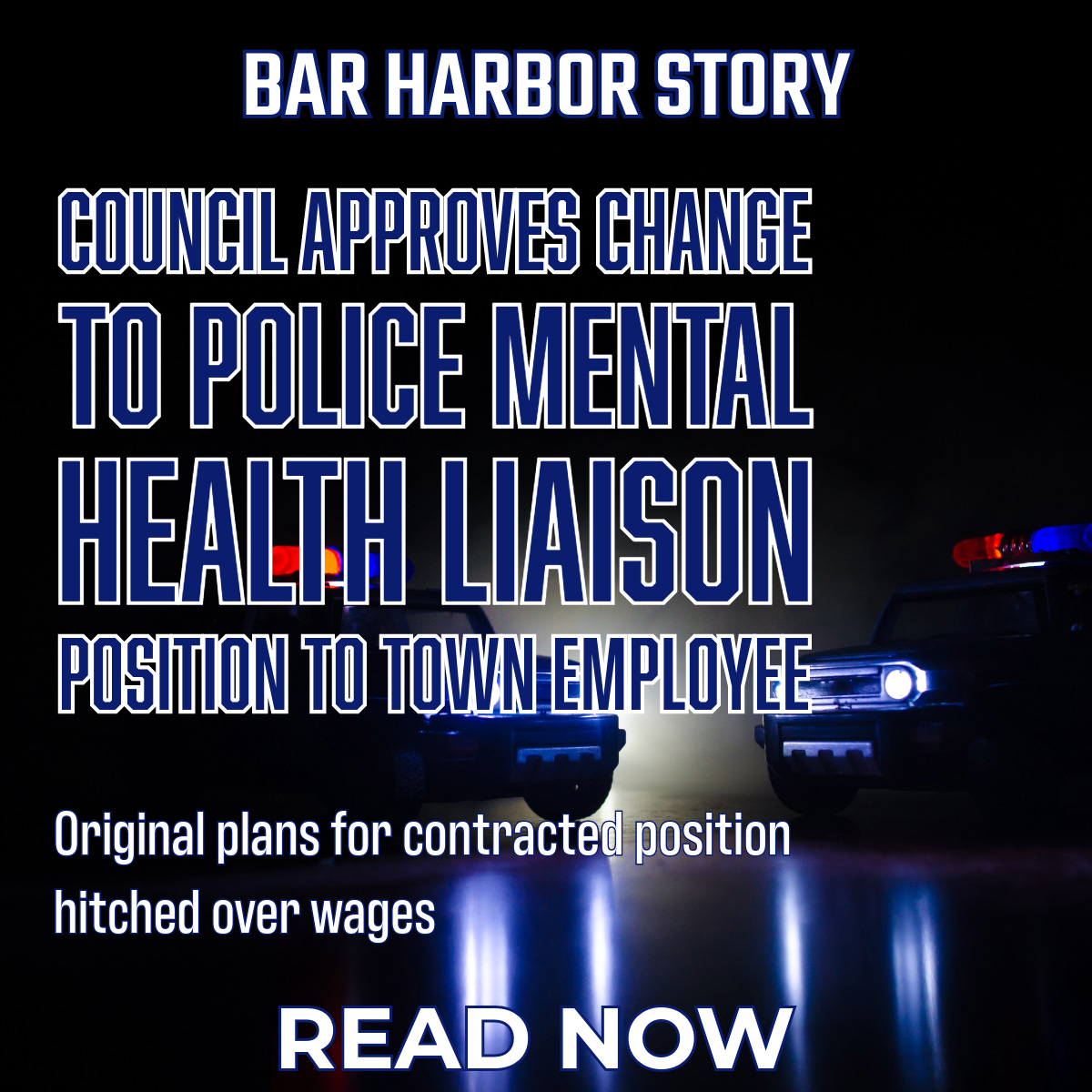Council Approves Change to Police Mental Health Liaison Position to Town Employee
Original plans for contracted position hitched over wages
BAR HARBOR—The town council unanimously approved a mental health liaison as a shared position between the Bar Harbor and Mount Desert Police Departments on Tuesday during its regular meeting.
If it felt like déjà vu, that’s because in a way, it was. The position was approved earlier this year as a contracted position using American Rescue Plan Act (ARPA) funds, which were federal funds provided to municipalities to help during the COVID-19 pandemic.
However, issues with Aroostook Mental Health Services, Inc. (AMHC ) about payment during the contract discussion has delayed the program, which was meant to start in May 2023, and also inspired interim Police Chief David Kerns to go before the Council looking for guidance. Kerns said that almost two years ago the departments did a program with AMHC about crisis work. The crisis worker that AMHC sent to MDI worked out of the police department on a trial basis for a year.
AMHC is a non-profit community mental health center that provides behavioral healthcare.
“We saw huge dividends for having a mental health worker in our agency,” Kerns said.
Because of its success, Kerns said, the position was proposed as a 60-40 split, with Bar Harbor paying 60% and Mount Desert 40% of the costs. Things got a bit tricky during the negotiations.
“The wage was a lot less than what we were just paying our parking employees,” Kerns said of the AMHC contract. The police departments wanted the wage to be closer to dispatchers’ wages.
The department has signed a memorandum of understanding with a 30-day exit clause. No one has been hired. No money has been exchanged. Kerns said that the department was having concerns when it was having this much problem at the starting gate.
But, he emphasized, the need is still there.
“We’ve seen an uptick in the number of mental health calls,” Kerns said. He said he couldn’t give a number but somewhere between 1/3 and ½ of all calls have a mental health component or substance abuse component involved.
After the high school lockdown last fall, the social worker helped the officers process the trauma that they went through, Kerns said.
Kerns said that as a law enforcement agency, they couldn’t easily connect people who had escalating behavior get into services that would help with their mental health or substance abuse. The officers, he said, ended up in high speed chases or they might have to interact with those people who had weapons in the home. The position can help connect people to the hospital’s services and state services. Social workers are better able to do exit strategies from the hospital.
It would be a 60-40 split and housed out of Bar Harbor, Kerns said, because there is more Bar Harbor calls. There is a limited amount of space at the station, Kerns said.
“She’s accepted as one of us now,” Kerns said. “Police officers—it’s a different environment. The atmosphere is kind of loose sometimes and it’s not for everyone.”
“You see news reports every day around the country,” where incidents escalate, Hochman said. The position is a commitment to de-escalation, he said. “I don’t think them being a town employee rather than an employee really changes anything.”
Shank asked about benefits if the position was now a town employee. According to an email from Finance Director Sarah Gilbert Wednesday, the position’s annual salary is $53,932 plus benefits. With benefits (maximum exposure/family insurance, retirement, accrued leave) the total cost estimate is $84,110. Bar Harbor’s 60% of that is $50,466. The original proposal also included benefits.
Next year the position would have to be put in the budget to continue.
MORE ABOUT MENTAL HEALTH LIAISONS
According to Ashley Abramson, writing for the American Psychological Association,
“It’s estimated that at least 20% of police calls for service involve a mental health or substance use crisis, and for many departments, that demand is growing. In a nationwide survey of more than 2,400 senior law enforcement officials conducted by Michael C. Biasotti, formerly of the New York State Association of Chiefs of Police, and the Naval Postgraduate School, around 84% said mental health–related calls have increased during their careers, and 63% said the amount of time their department spends on mental illness calls has increased during their careers. More than half reported the increased time is due to an inability to refer people to needed treatment. Referring to appropriate mental health resources—and following up on progress—takes time and resources that already strained police, especially those from smaller departments, don’t always have.
“As a result, more police departments are teaming with mental health clinicians—including psychologists—out in the field or behind the scenes via crisis intervention training. When these groups collaborate well, people with mental illness in crisis can access mental health care more easily, police experience less trauma and stress, and clinicians have an opportunity to make an even bigger difference in the community. Early data also indicate that these partnerships are making communities healthier, safer, and more financially secure.”
SHARED POSITIONS
The new mental health liaison is the sixth position that Bar Harbor and Mount Desert share. Those positions are:
Chief of Police
Police captain
Police administrator
EMS deputy chief
HR manager
Mental health liaison
A request for a comment from AMHC was not successful.
LINKS TO LEARN MORE:
Link to earlier story about the liaison







